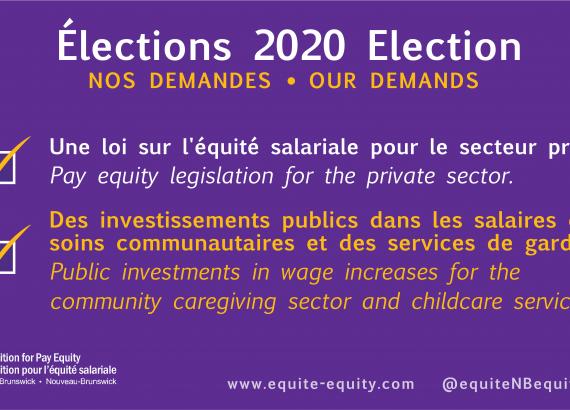Moncton — In light of the provincial election to be held on September 14, 2020, the New Brunswick Coalition for Pay Equity is seeking commitments from all political parties on the following issues:
- Pay equity legislation for the private sector
COVID-19 has exacerbated existing gender inequities in the labor market:
- Women make up the majority of frontline workers;
- People in many predominantly female jobs such as cashiers, cleaners and senior care workers are underpaid;
- As a result of poor wages, more women left their jobs to care for their children at home.
“Pay inequity affects women and their place in the workforce and society. It’s time to eliminate pay discrimination and change how we value work,” says Frances LeBlanc, the Coalition Chair.
Extending the Pay Equity Act, 2009 to the private sector would ensure all workers in female-dominated jobs receive equal pay for work of equal value. Their wages should be equal to the wages of employees in male-dominated jobs of comparable value based on the skills, responsibilities, effort, and working conditions.
“Pay equity is a human right,” added Frances LeBlanc.
- Public investments in wage increases for community caregiving and childcare services
The pandemic is shedding light on the important work that workers in the community caregiving sector and childcare services have been providing for so long, with little recognition, in caring for the most vulnerable, including seniors, children, people with disabilities, and women fleeing violence.
“We are calling on the next government to develop a long-term plan to ensure that wages in these services reflect the value of their work and reaches pay equity,” explained Frances LeBlanc.
The community caregiving sector was in crisis long before the pandemic. On average, hourly wages in the sector range between $14 and $16. The temporary pay increases allocated during COVID-19 are not a long-term solution. These services need public investments through permanent wage adjustments.
“The next government will decide what a post-COVID-19 New-Brunswick will look like. It will need to take a broad approach to the economic recovery by investing in our social infrastructure, increasing economic justice and security, and ensuring the full participation of women in the development and implementation of recovery plans,” added Frances LeBlanc.
